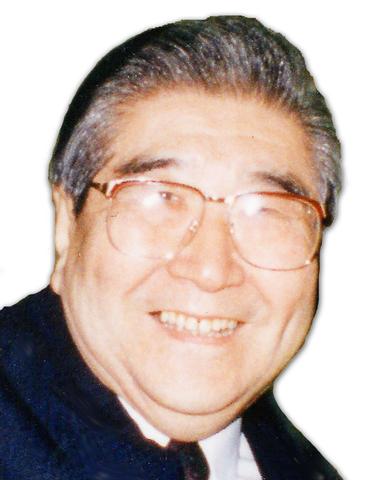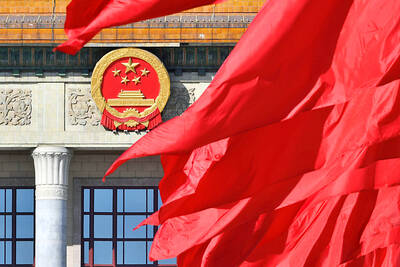Old soldiers never die; they just fade away," said former legislative speaker Liang Su-yung (梁肅戎) in 1991 before stepping down as a tenured lawmaker -- a residual position from the days of martial rule. His friends like to joke that even if the feisty KMT elder wastes away physically, his tongue will remain razor-sharp.
Indeed, Liang, 81, recently made headlines when he petitioned the KMT to oust former president and party chairman Lee Teng-hui (

TAIPEI TIMES FILE PHOTO
"The party has clearly said that it would oust any member who joined other political groups," Liang said, referring to a much-talked-about exodus of pro-Lee KMT members, who are disappointed with the party's increasingly pro-unification stance.
"Lee, who is orchestrating the exodus from behind the scenes, should be given the same punishment," he argued.
A mainlander, Liang has never veiled his distaste for the Taiwanization policy, branding it a parochial scheme by independence advocates to permanently separate Taiwan from the "motherland."
"As long as I live, I will do everything possible to prevent that from happening," Liang said. "It is my duty as a citizen to help keep the country [China] whole."
In 1996, Chinese President Jiang Zemin (
Unfazed, Liang in 1998 co-founded the Strait Peaceful Re-unification Association that has sponsored international forums to promote eventual unification between Taipei and Beijing. "I'll carry on with the mission, popular or not. That is my philosophy -- fighting for what I believe until I die," Liang said while leader of KMT's Central Advisory Committee.
Blunt and persistent, Liang has been a gadfly even with the KMT, of which he became a member while a freshman in college in northeastern China. He joined the underground fight against the Japanese army during the 1940s and was jailed for 18 months until the Allied victory enabled his freedom. In 1948 he was elected a legislator for his home province of Liaoning and soon followed Chiang Kai-shek (蔣介石) to Taiwan after the KMT lost the civil war to the communists.
A lawyer by training, Liang volunteered in 1960 to defend Lei Chen (
"A firm believer in democracy and human rights, I helped bring about important liberal reforms in Taiwan, notably the right to counsel for the accused," Liang said.
Political dissidents of the time admired Liang, and four years later Peng Ming-min (
"Liang is indeed nice, if stubborn," Control Yuan member Kang Ning-hsiang (
Unsurprisingly, Liang failed to get either client acquitted, as was normal under the regime.
Sympathetic with the protest movement, he was later asked by Chiang Ching-kuo (
"Today, I still pride myself on convincing Chiang not to invoke violence or bloodshed in dealing with the protest movement," he said. "It took great courage to confront a leader who ran the country by iron rule."
In 1990, Liang hit the peak of his political career when Lee, who took power two years earlier, made him the head of the legislature. In return, Liang strived to make the KMT-controlled legislature faithfully toe the party line, to the disgust of the opposition.
"Power-hungry and bellicose, Liang was the least neutral speaker I've ever seen," said then DPP lawmaker Chen Shui-bian (
Fellow lawmaker Chang Chun-hsiung (
"That's the biggest insult I've ever had in all my life," Liang said. "Of the DPP, I hate Chen and Hsieh the most. They simply don't know how to show respect for people who have differing ideas."
While grateful for Lee's patronage, Liang opposed his Taiwanization policy. For that reason, the Collective Wisdom Club (
Eventually, his criticism of Lee cost him his post as a senior presidential advisor in 1996, and he has since worked as a self-appointed peacemaker across the Strait.
"Privately, I'm indebted to Lee, who had aides send me NT$300,000 when my wife was hospitalized years back and then sent another NT$300,000," Liang said.
"Still, I can't tolerate him advocating independence even if only indirectly."
Daunted by Lee's stance, the KMT has shunned confronting its former chairman head-on, although the patriarch has repeatedly faulted the party for discarding his "Taiwan first" course.
"Those calling for Lee's removal constitute only a small minority of the party's membership," KMT Secretary-general Lin Fong-cheng (林豐正) has said. "For a matter so sensitive, the party has to exercise extra caution."
Unconvinced, Liang and his allies plan to take their grievances to the party's congress at the end of this month.
As for the confederation proposed by incumbent KMT Chairman Lien Chan (
Asked if he would consider quitting the party that is in danger of splitting after the December election, he said, "No. I will die with the KMT. Those who dislike me may leave."

US PUBLICATION: The results indicated a change in attitude after a 2023 survey showed 55 percent supported full-scale war to achieve unification, the report said More than half of Chinese were against the use of force to unify with Taiwan under any circumstances, a survey conducted by the Atlanta, Georgia-based Carter Center and Emory University found. The survey results, which were released on Wednesday in a report titled “Sovereignty, Security, & US-China Relations: Chinese Public Opinion,” showed that 55.1 percent of respondents agreed or somewhat agreed that “the Taiwan problem should not be resolved using force under any circumstances,” while 24.5 percent “strongly” or “somewhat” disagreed with the statement. The results indicated a change in attitude after a survey published in “Assessing Public Support for (Non)Peaceful Unification

The CIA has a message for Chinese government officials worried about their place in Chinese President Xi Jinping’s (習近平) government: Come work with us. The agency released two Mandarin-language videos on social media on Thursday inviting disgruntled officials to contact the CIA. The recruitment videos posted on YouTube and X racked up more than 5 million views combined in their first day. The outreach comes as CIA Director John Ratcliffe has vowed to boost the agency’s use of intelligence from human sources and its focus on China, which has recently targeted US officials with its own espionage operations. The videos are “aimed at

‘MISGUIDED EDICT’: Two US representatives warned that Somalia’s passport move could result in severe retaliatory consequences and urged it to reverse its decision Minister of Foreign Affairs Lin Chia-lung (林佳龍) has ordered that a special project be launched to counter China’s “legal warfare” distorting UN Resolution 2758, a foreign affairs official said yesterday. Somalia’s Civil Aviation Authority on Wednesday cited UN Resolution 2758 and Mogadishu’s compliance with the “one China” principle as it banned people from entering or transiting in the African nation using Taiwanese passports or other Taiwanese travel documents. The International Air Transport Association’s system shows that Taiwanese passport holders cannot enter Somalia or transit there. The Ministry of Foreign Affairs (MOFA) protested the move and warned Taiwanese against traveling to Somalia or Somaliland

SECURITY: Grassroots civil servants would only need to disclose their travel, while those who have access to classified information would be subject to stricter regulations The government is considering requiring legislators and elected officials to obtain prior approval before traveling to China to prevent Chinese infiltration, an official familiar with national security said yesterday. President William Lai (賴清德) in March announced 17 measures to counter China’s growing infiltration efforts, including requiring all civil servants to make trips to China more transparent so they can be held publicly accountable. The official said that the government is considering amending the Act Governing Relations Between the People of the Taiwan Area and Mainland Area (臺灣地區與大陸地區人民關係條例) to require all civil servants to follow strict regulations before traveling to China.